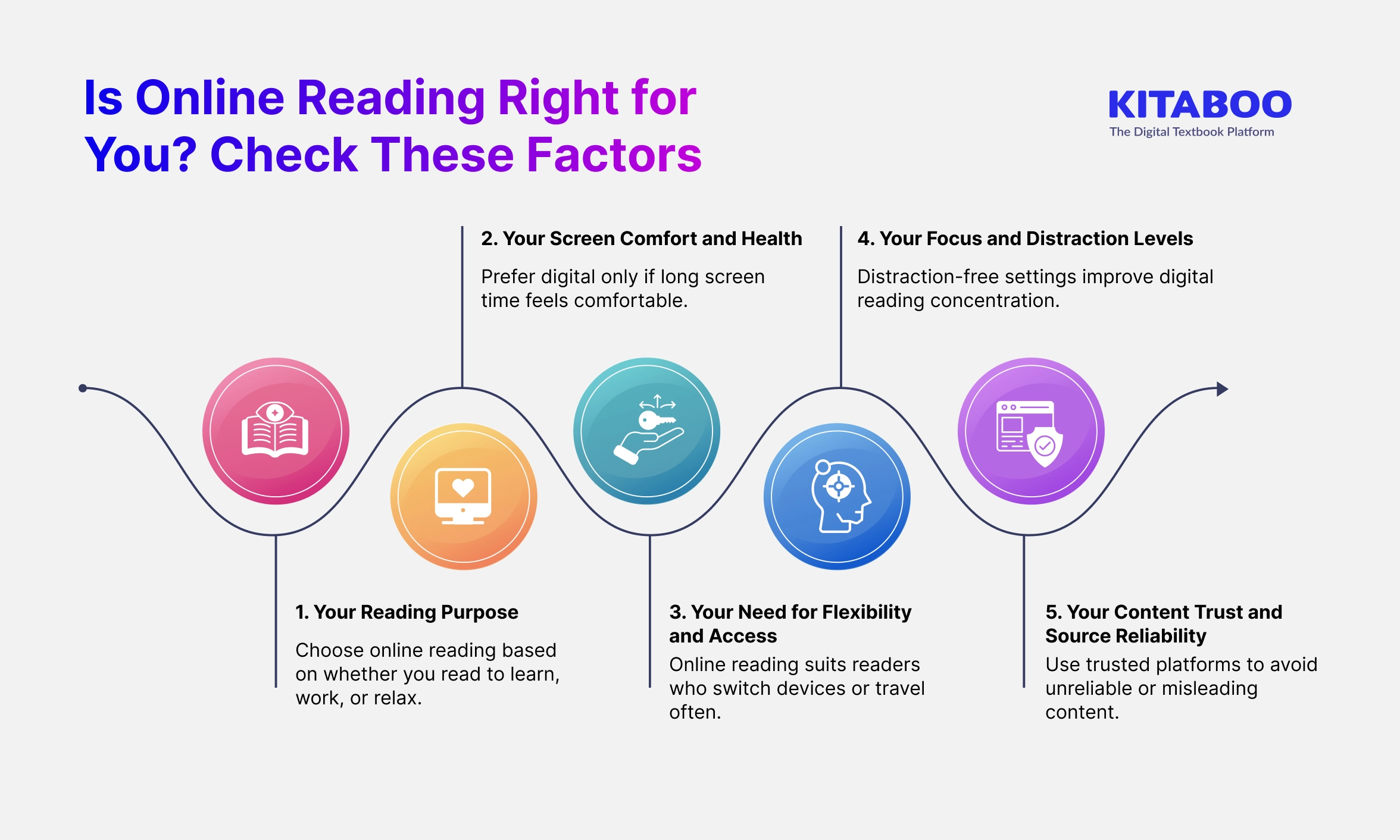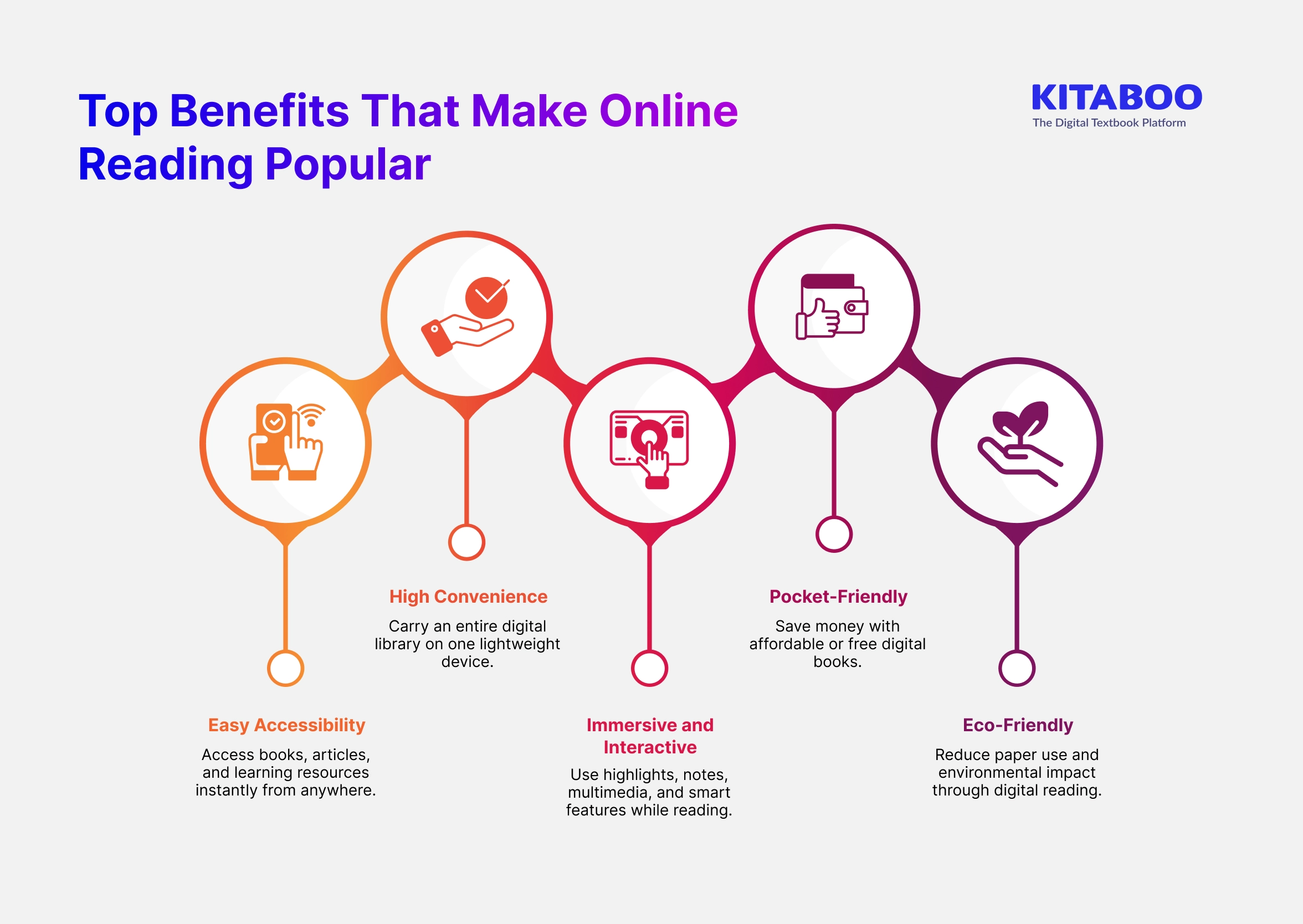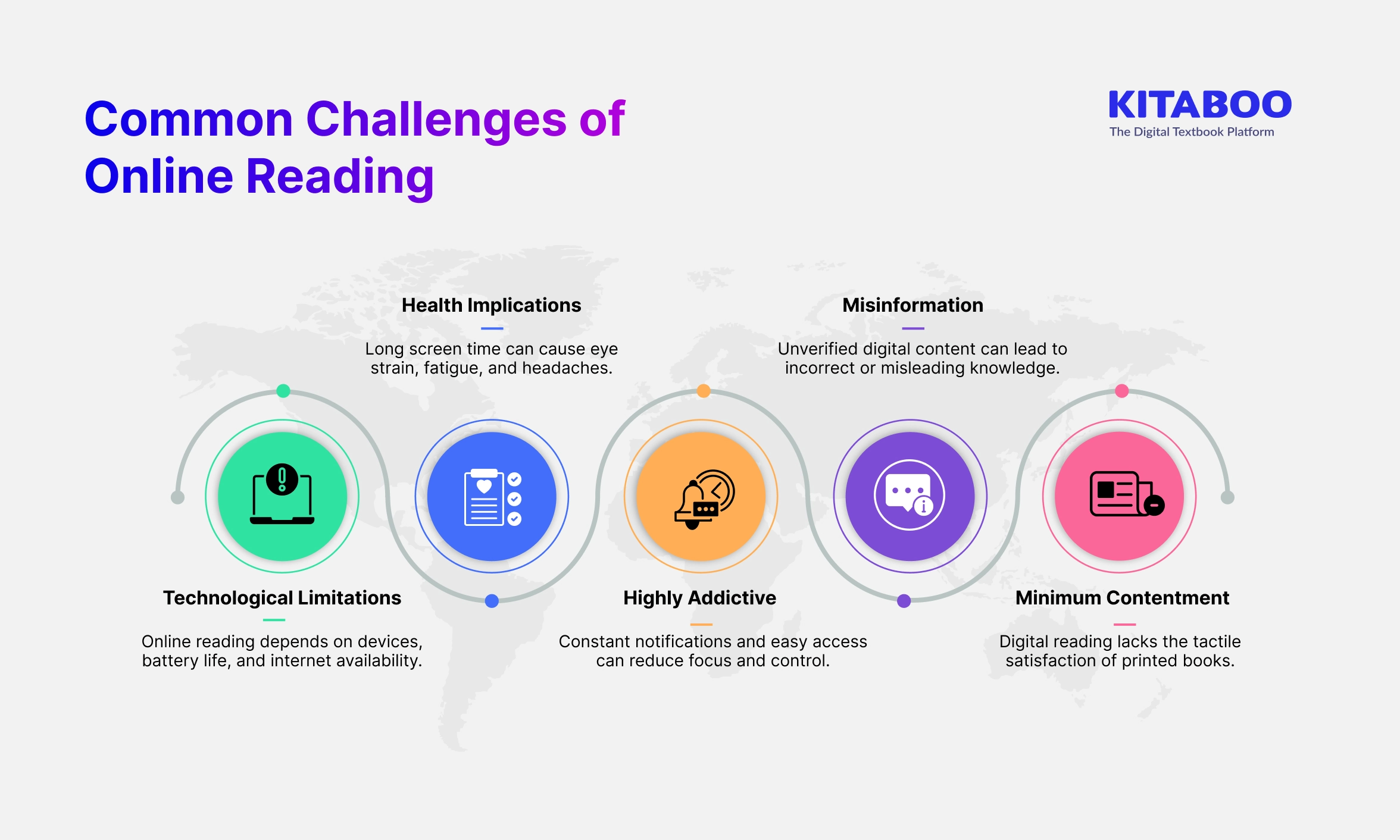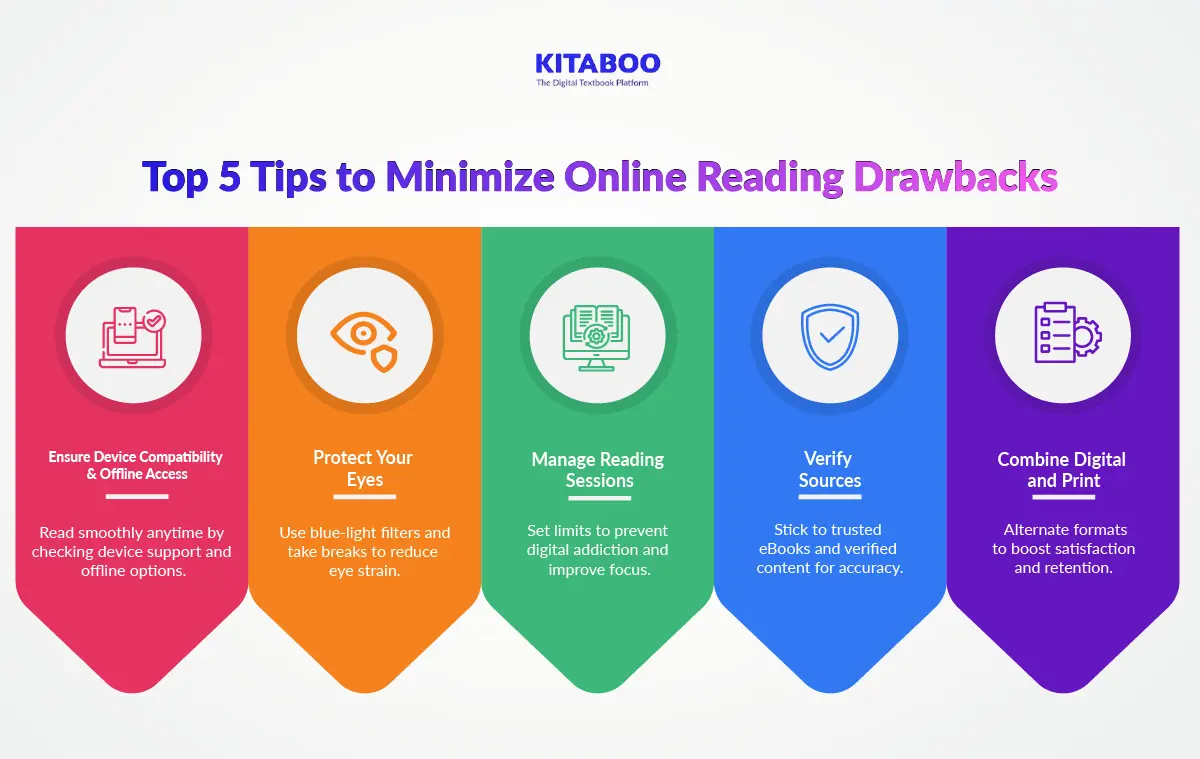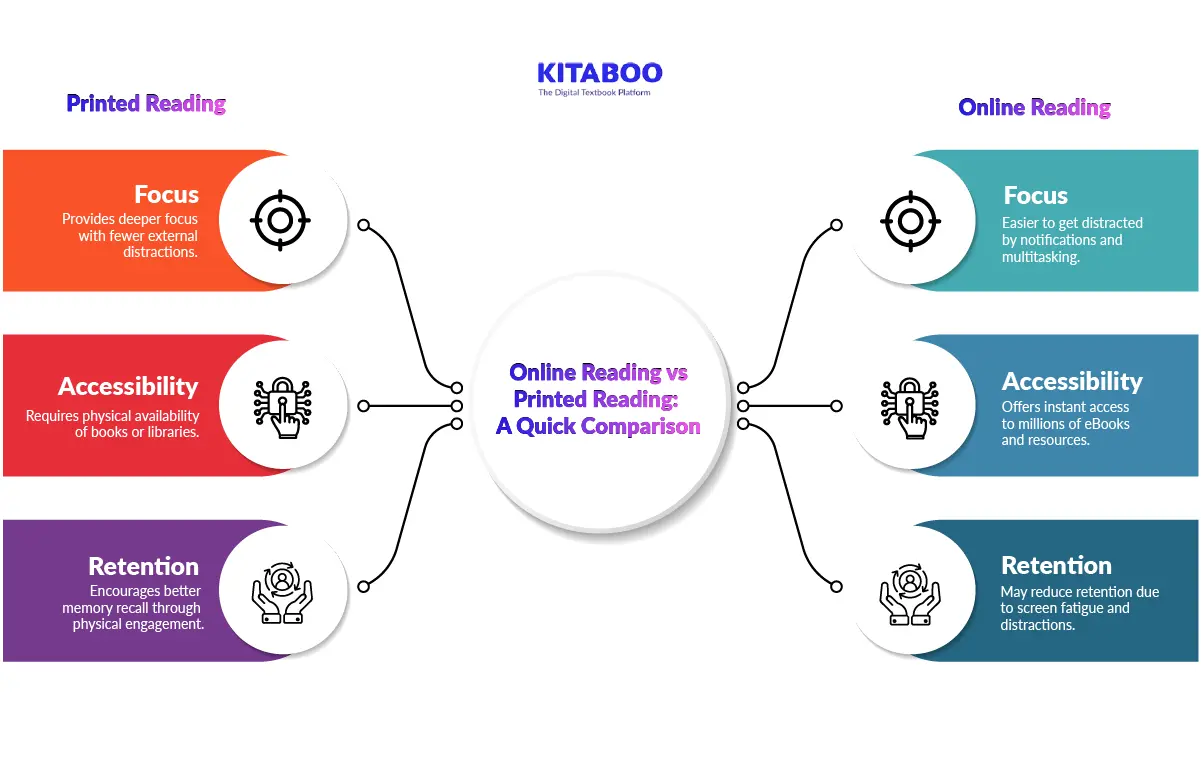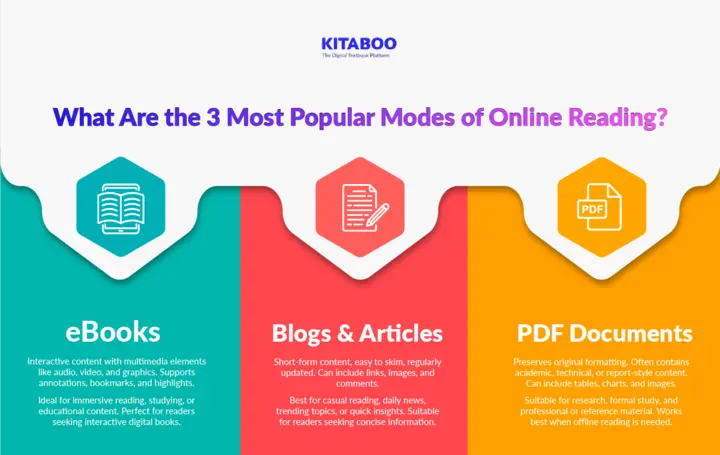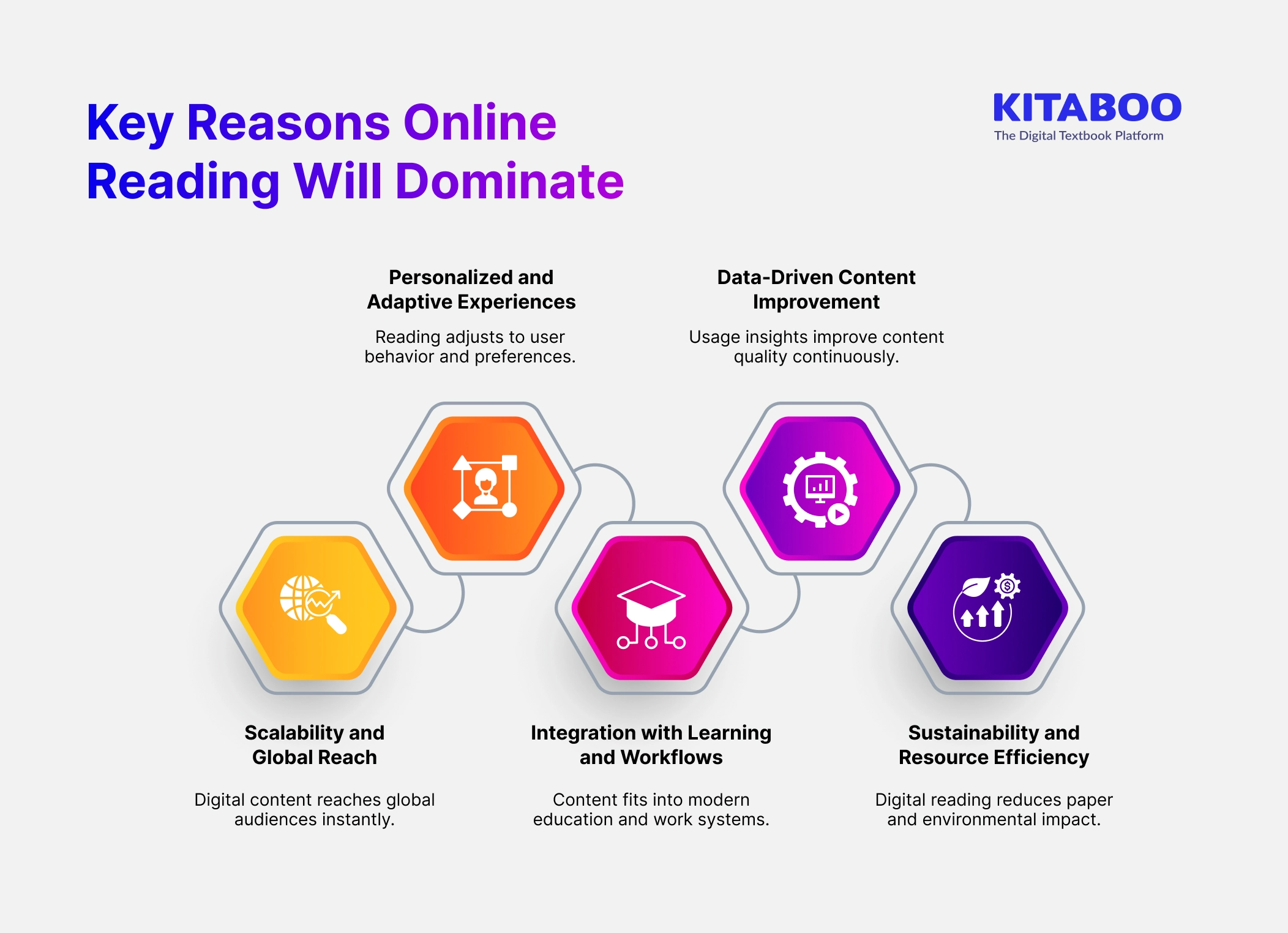
What Are the Pros and Cons of Online Reading?
Summarize this blog with your favorite AI:
Pros and Cons of Online Reading – TL;DR
Online reading offers flexibility, accessibility, and interactive digital books, making it ideal for modern lifestyles. Digital reading benefits include affordability, portability, and sustainable reading options compared to traditional books.
However, there are online reading drawbacks like eye strain, distractions, and potential overuse. By balancing screen time with mindful reading habits, readers can maximize the benefits of online reading.
| Pros of Online Reading | Cons of Online Reading |
|---|---|
| Easy Accessibility: Access eBooks, PDFs, and online libraries anytime, anywhere. | Technological Limitations: Reading depends on device compatibility and battery life. |
| High Convenience: Carry thousands of books on compact devices with ease. | Health Implications: Prolonged screen time causes eye strain and mental fatigue. |
| Immersive & Interactive: Annotations, highlights, and multimedia enhance engagement. | Highly Addictive: Digital content can lead to distraction and excessive screen time. |
| Pocket-Friendly: Many eBooks are free or cheaper than printed books. | Misinformation: Online sources may not always be accurate or fact-checked. |
| Eco-Friendly: Reduces paper usage, supporting sustainable reading options. | Minimum Contentment: Some readers prefer the tactile experience of printed books. |
How to Decide if Online Reading is Right for You?
Choosing online reading depends on your habits, goals, and comfort with digital devices. Understanding the pros and cons of online reading helps you match the format to your needs and preferences.
This section helps you evaluate whether digital reading fits your personal or professional needs.
1. Your Reading Purpose
If your reading is for learning, research, or skill development, online reading offers strong advantages. The pros and cons of online reading become clear when you compare interactivity and depth.
Digital formats support search, annotations, and multimedia. These features improve comprehension for complex topics. For focused literary reading, printed books may still feel better.
2. Your Screen Comfort and Health
Your tolerance for screen time matters when choosing online reading. The pros and cons of online reading include convenience versus eye strain.
If you experience discomfort, digital reading may reduce enjoyment. Using blue light filters and breaks can help. Comfort should guide your reading choice.
3. Your Need for Flexibility and Access
If you read across devices or while traveling, online reading offers flexibility. The pros and cons of online reading highlight portability and instant access.
Digital books remove location and storage limits. This suits mobile professionals and students well. Offline access also improves reliability.
4. Your Focus and Distraction Levels
Online reading can introduce notifications and interruptions. The pros and cons of online reading include engagement versus distraction.
If you struggle with focus, digital formats may reduce retention. Using distraction-free modes improves concentration. Awareness helps manage this challenge.
5. Your Content Trust and Source Reliability
Online reading requires careful source selection. The pros and cons of online reading include broad access and misinformation risks.
Verified platforms reduce the chance of incorrect information. Choosing trusted publishers improves learning quality. Source awareness protects reading integrity.
This evaluation helps you align the pros and cons of online reading with your needs. It ensures your reading choice supports comfort, learning, and long-term satisfaction.
Online reading is now a part of daily life for millions of people worldwide. Readers often weigh the pros and cons of online reading before switching from paper to screens.
If we account for eBooks exclusively, around 980 million readers exist globally today. This rise highlights the growing digital reading benefits compared to printed books.
Yet, the debate of digital reading vs printed reading continues, with both formats offering unique strengths.
A platform like KITABOO makes publishing and distributing interactive digital books effortless. This enhances the digital reading benefits and makes a strong case for sustainable reading options.
In this blog, we’ll break down the advantages and disadvantages of online reading.
You’ll discover online reading benefits like accessibility, affordability, and convenience. You’ll also learn online reading drawbacks such as screen fatigue and reduced satisfaction. This balanced view helps you make informed choices.
Table of Contents
- What Are the Pros of Online Reading – 5 Advantages of Digital Reading
- What Are the Cons of Online Reading – 5 Disadvantages of Digital Reading
- Top 5 Tips to Minimize Online Reading Drawbacks
- Online Reading vs Printed Reading: A Quick Comparison
- What Are the 3 Most Popular Modes of Online Reading?
- Why is Online Reading the Future?
- Wrapping Up
- FAQs
What Are the Pros of Online Reading - 5 Advantages of Digital Reading
Online reading offers many advantages that appeal to readers across age groups and professions. The key digital reading benefits are shaping how people consume books today.
When discussing the pros and cons of online reading, the benefits often outweigh the limitations.
Knowing the advantages and disadvantages of online reading guides readers toward smarter choices. Here, we explore top five online reading benefits in detail.
1. Easy Accessibility
eBooks, PDFs, blogs, articles, digital libraries, discussion forums, etc., provide a plethora of knowledge and in-depth insight about different subjects and topics.
Also read: How Digital Content Platforms Can Boost Member Engagement and Retention
So, through online reading, you are always just an internet connection away from exploring such a vast range of information. This easy accessibility is unparalleled and one of the biggest reasons behind its soaring popularity.
One of the major online reading benefits is unlimited access to content anytime, anywhere. Readers can quickly search within digital texts to locate information in seconds. This ease of accessibility and searchability saves time and supports more efficient reading experiences.
When comparing digital reading vs printed reading, accessibility is one of the top digital reading benefits.
2. High Convenience
There’s no hassle of carrying heavy books wherever you go. Thanks to online reading, you could just be carrying your smartphone, laptop, tablet, or any such compact digital device, and that’s it.
A significant number of books will shrink into weightless digital files and appear on your screen – whenever and wherever you want.
One of the most popular digital reading benefits is the unmatched portability. Interactive digital books are easy to fit into your pocket.
Online reading benefits like easy access and convenience make it easy to carry a library. However, the advantages and disadvantages of online reading depend on the screen time.
Readers enjoy multiple online reading benefits. But balancing convenience with mindful usage will ensure a healthier experience.
3. Immersive & Interactive
eBooks can be fabricated in ways that they turn out to be more immersive and interactive than traditional books.
For example, KITABOO offers features such as text highlighting, annotation, and bookmarking that are unique to digital books only. Such interactive add-ons make online reading immersive and enhance the overall experience.
4. Pocket-Friendly
Traditional books are super expensive. This means you’ll have a tough time saving money if you are an avid reader.
But on the contrary, digital books are very cheap. In fact, many online platforms also sell eBooks for free of cost or on affordable rent. This cost-efficiency is another major edge online reading has over offline reading.
5. Eco-Friendly
Data suggests that as many as 4 billion – 8 billion trees are slashed yearly to produce paper for books. This, in turn, ends up taking a huge toll on our surroundings and disrupts our ecosystem.
At the same time, there are no such environmental repercussions associated with online reading. As all the content is saved in a paperless file format, it’s environmentally healthier and a sustainable choice.
What Are the Cons of Online Reading - 5 Disadvantages of Digital Reading
While there are multiple online reading benefits, one shouldn’t ignore the disadvantages of digital reading. The pros and cons of online reading often go hand in hand.
While online reading benefits are undeniable, there are a few online reading drawbacks to consider.
Understanding the advantages and disadvantages of online reading will help you make better-informed choices.
1. Technological Limitations
Online reading is highly dependent on technology. While it has its pros, there are also several cons to it. For instance, you can’t read if your smartphone’s battery is down or if your device isn’t compatible with the file format of your eBook.
Alternatively, if you are in a ‘no-internet’ zone, you won’t be able to access your eBook. Although KITABOO offers an offline reading experience by letting you download your eBook, most other publishers don’t. This creates an acute discomfort.
2. Health Implications
Digital devices such as smartphones, laptops, tablets, etc., emit harmful blue light from their screens. This light is severely damaging to the eyes and causes multiple eyesight issues.
In fact, prolonged online reading is also proven to cause mental fatigue. So, one must be mindful of how many hours they spend reading online.
The disadvantages of digital reading include long-term vision problems caused by excessive device use. Among the pros and cons of online reading, eye strain is one major drawback.
Extended screen time often leads to eye strain, headaches, and reduced focus. Balancing screen exposure maximizes online reading benefits while minimizing health risks.
3. Highly Addictive
The habit of consuming content, even books, through digital means turns out to be dangerously addictive. This is part of the reason why 61% of the internet users are addicted to it.
Not only is this fixation harmful to an individual’s physical, mental, and emotional well-being, but it also negatively impacts brain development in kids and teenagers.
One of the major online reading drawbacks is constant distraction during study or work. Interactive digital books send regular notifications. This can reduce focus.
Despite clear online reading benefits, frequent interruptions often weaken comprehension and retention. While discussing the advantages and disadvantages of online reading, distraction makes a strong case.
4. Misinformation
One of the biggest reasons why many people steer clear of online reading is because it can be misleading sometimes.
Not all blogs, articles, or threads that you read on the internet are true and fact checked. So, it’s very easy to be misinformed and remain ignorant on a topic.
5. Minimum Contentment
eBooks can never replace traditional books and the experience associated with them. They may be more immersive and interactive, but the level of satisfaction you feel while reading a book, turning its pages, and finally finishing it is wholesome and unique!
So, while both provide the same knowledge, the level of contentment in online reading is much lesser than in offline reading.
Top 5 Tips to Minimize Online Reading Drawbacks
Understanding the advantages and disadvantages of online reading helps readers enjoy the digital reading benefits. These tips focus on addressing common online reading drawbacks and improving the overall experience.
1. Ensure Device Compatibility & Offline Access
Checking your device’s compatibility with eBooks or PDFs ensures smooth reading without interruptions. Using platforms like KITABOO that provide offline access allows uninterrupted study or leisure reading.
This enhances online reading benefits and prevents tech-related frustrations, a common disadvantage of digital reading.
2. Protect Your Eyes
Prolonged screen time can strain eyes, so schedule regular breaks during reading sessions.
Enable blue-light filters or night mode to reduce harmful exposure from digital devices.
Taking these precautions safeguards eye health while maintaining digital reading benefits. Taking regular breaks also minimizes this significant online reading drawback.
3. Manage Reading Sessions
Reading continuously online can be addictive, affecting mental and physical well-being.
Set fixed reading times and mix offline activities to control screen usage effectively.
This approach preserves the online reading benefits. It also addresses addictive tendencies, which can become a key disadvantage of digital reading.
4. Verify Sources
Not all digital content is reliable, so always cross-check facts with trusted sources.
Focus on verified eBooks, research papers, and official publications for accurate information.
Fact-checking enhances learning accuracy and reliability. This helps in mitigating the online reading drawback of misinformation.
5. Combine Digital and Print
Digital books offer interactivity, while printed books give tactile satisfaction and nostalgia. Alternating between both formats creates a fulfilling reading experience and improves knowledge retention.
This balances digital reading vs printed reading. It also reduces the disadvantages of online reading and maximizes overall enjoyment.
Online Reading vs Printed Reading: A Quick Comparison
Understanding the differences between online reading vs traditional reading is crucial. Each format offers unique strengths, depending on the situation and preference.
Online reading benefits include portability, searchability, and interactive features that enrich the experience. Printed reading provides a tactile connection and reduces the risk of digital distractions.
Some learners retain information better through physical books, while others prefer interactive digital books. Here is a comparison of digital reading vs printed reading.
How to Guide:
How to Transform Print Titles into Interactive eBooks
What Are the 3 Most Popular Modes of Online Reading?
When it comes to traditional reading, the only option you have is books. But one can indulge in online reading in many ways. Three of the most common ones are:
- eBooks: eBooks, or electronic books, are one of the most prevalent modes of online reading. They refer to the digital version of printed books and are readily available online. They are highly interactive, consisting of elements like graphics, audio, video, animations, etc.
- Blogs & Articles: A very popular source of information for all who use social media, blogs, and articles are a type of digital written content. They are available on online websites, and they generally cover everyday topics in minimum words.
- PDF Documents: These are downloadable pieces of written content that often contain reports, scientific studies, research papers, etc. Apart from academic information, PDF documents sometimes also offer novels, poetries, and storybooks in a digital format.
Why is Online Reading the Future?
Online reading is not just a format shift. It represents a fundamental change in how knowledge is created, updated, distributed, and experienced. When evaluated through the pros and cons of online reading, the long-term advantages clearly support digital adoption.
The future of reading lies in systems that scale, adapt, and improve continuously.
1. Scalability and Global Reach
Online reading removes physical distribution barriers completely. A single digital release can reach millions across regions within minutes. This enables faster education access, corporate training, and knowledge sharing globally.
Content updates no longer require reprinting or reshipping. This scalability is unmatched by print and defines the future of publishing.
2. Personalized and Adaptive Experiences
Digital reading adapts to the reader rather than forcing a fixed format. Platforms adjust layouts, font sizes, reading modes, and recommendations based on user behavior. This personalization improves engagement and learning outcomes.
When comparing the pros and cons of online reading, adaptability remains one of its strongest advantages over static print formats.
3. Integration with Digital Learning and Workflows
Online reading integrates directly into education, training, and work ecosystems. Readers can annotate, collaborate, search, and share content within structured platforms. This supports modern classrooms, remote learning, and enterprise training.
Print cannot integrate with learning management systems or analytics tools. This integration makes digital reading operationally essential.
4. Continuous Content Improvement Through Data
Digital platforms generate insight into how content is used and where readers struggle. Publishers and educators refine materials based on real engagement data. This leads to better structured, more effective content over time.
This feedback loop does not exist in print publishing. It transforms reading into an evolving experience.
5. Sustainability and Resource Efficiency
Digital reading significantly reduces paper usage, printing, and logistics. Organizations seeking lower environmental impact increasingly prefer digital formats.
One device can replace hundreds of printed books across years. This makes online reading a more sustainable long-term solution for institutions and publishers.
Online reading continues to evolve while addressing its limitations. When viewed holistically through the pros and cons of online reading, digital formats offer scalability, adaptability, and sustainability that print cannot replicate. This positions online reading as the future of content consumption.
Wrapping Up
Online reading provides unmatched digital reading benefits for convenience, accessibility, and interactive learning. Despite some online reading drawbacks, these can be managed with mindful reading habits.
Interactive features enhance comprehension and retention compared to traditional books. Portability and cloud access make online reading vs traditional reading highly flexible for modern lifestyles. Balancing screen time ensures eye health while enjoying immersive content.
When you compare the advantages and disadvantages of online reading, you get a clear picture. The decision is skewed in favor of digital reading when used mindfully and wisely.
To ensure an excellent online reading experience, you need a platform that understands your needs. Enhance your interactive digital books experience with the KITABOO reader. Start your journey towards a secure and engaging online reading experience.
Contact our expert team now and get started!
To know more, please write to us at contact@web-staging.kitaboo.com.
FAQs
Both have pros and cons, but digital reading benefits include flexibility and interactive features.
Adjust brightness, use night mode, take breaks, and maintain proper posture while reading digitally.
Yes, many eBooks are free or low-cost, making them a pocket-friendly online reading option.
Platforms like KITABOO provide secure, interactive, and multimedia-rich eBooks for readers and learners.
Online reading benefits include easy accessibility, portability, affordability, eco-friendliness, and interactive digital content.
Online reading drawbacks include eye strain, distractions, addiction, misinformation, and lower contentment compared to physical books.
Online learning offers flexibility, accessibility, and multimedia engagement, but may cause screen fatigue and reduced in-person interaction.
Online reading offers convenience and access, while physical reading enhances focus and tactile experience. The choice depends on reader preference.
eBooks may cause eye strain, distractions, device dependency, and lack the physical experience of printed books.
Some platforms track reading time, progress, and interactions to improve content quality, based on their privacy policies.
Yes, digital reading supports shared annotations, comments, and discussions, enabling real-time collaboration.
Discover how a mobile-first training platform can help your organization.
KITABOO is a cloud-based platform to create, deliver & track mobile-first interactive training content.
